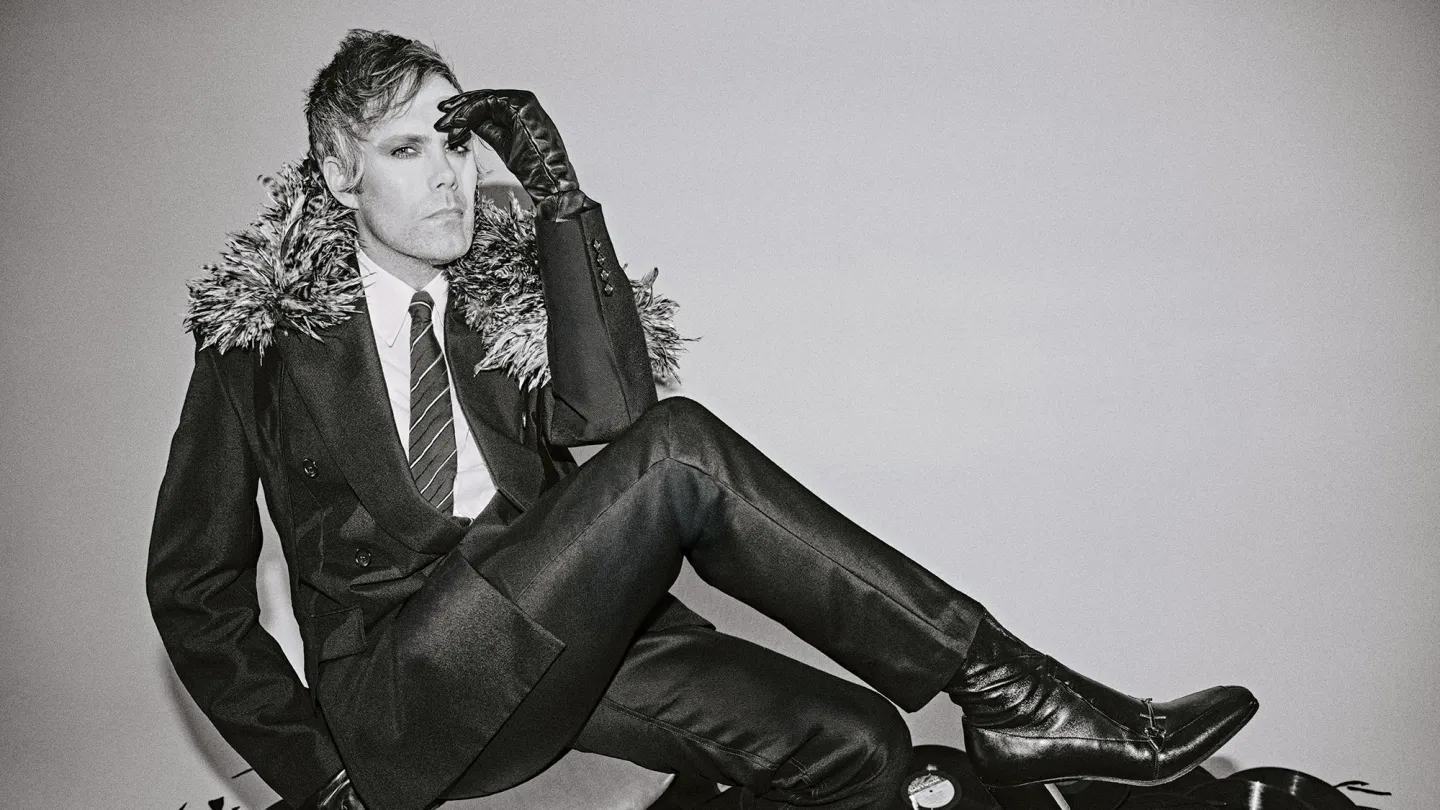
Justin Tranter is the 70 billion stream man.
If you’re not a music industry insider, the chances you haven’t heard of him are high. But unless you’ve neglected to turn on a radio, enter a grocery store, go to the dentist or, really, be anywhere music might have been playing in the past 10 years, the chances you haven’t heard his songs are practically nonexistent.
During the past decade, Tranter has established himself as one of the music industry’s most reliable hitmakers, thanks to his clever, boisterous lyricism and dramatic, over-the-top choruses and hooks. His 30 most popular songs on Spotify alone have a combined 30 billion streams, with the top 15 earning 74 platinum certifications from the Recording Industry Association of America. Among his legion of hits are Imagine Dragons’ “Believer,” Justin Bieber’s “Sorry,” Selena Gomez’s “Lose You to Love Me” and Halsey’s “Bad at Love.” His most recent billion-stream smash is Chappell Roan’s “Good Luck, Babe!,” which launched her into global superstardom last year and earned them both a Grammy nomination for song of the year.
Among his fellow hitmakers, however, Tranter may earn the most respect for his advocacy of the craft, systemically sounding the alarm on what he warns is becoming an endangered species in the industry — songwriters.
“The song is the most important part of the music business,” Tranter explains, emphasizing each word as he hits the side of his fist into his other hand. “It all starts at the fucking song. So why aren’t we taking care of the people who make the song? It’s crazy.”
Songwriters need to be a more centered part of the business, he argues, otherwise the music — and the industry — will suffer: “If the labels don’t start taking care of songwriters, there won’t be any anymore, and it’s just going to be old people like me, who can afford to work for free.”
Of course, the reason Tranter is in that rarefied class is his knack for delivering hits. In a era where songs can have half a dozen co-writers, it can be hard to quantify just what any individual is contributing to a hit. But those who’ve worked with Tranter describe him as an ultimate collaborator, a muse who doesn’t seek to drive the narrative himself, but rather coax inspiration from the people with whom he’s working. He asks questions, prods for emotional responses, digs.
“He can pull out words that I wouldn’t even say, things I wouldn’t even realize could be lyrics,” Gomez says of Tranter, who has become one of her most frequent writing partners since he worked on her 2015 album, Revival, for which he penned the triple-platinum “Good for You” and double-platinum “Hands to Myself.” “He’s made every dark situation so light for me.”
Gomez describes Tranter’s process almost like a therapy session.
“One session, I texted him before and said, ‘I’m really sad today,’ ” she recalls. “He goes, ‘OK, let’s just talk about it when you get here. We don’t even have to write a song.’ He’d ask me questions like, ‘What’s my biggest fear in what’s going on here?’ and ‘What do you want to get out of it?’ He was writing all of it down, and in 45 minutes, we had ‘Lose You to Love Me.’ I remember crying, singing the first take. It was this huge relief in a beautiful way.” Their partnership continued this year with Gomez and Benny Blanco’s collaborative album, I Said I Love You First. Tranter is credited on six songs.
This year, Kid Cudi, one of the most influential voices in alternative hip-hop, tapped Tranter specifically, as the rapper looked to make the plunge into pop and alternative rock on his latest album, Free, with Tranter writing and producing a majority of the record.
“Justin can make anyone feel like they’ve known him for years,” Cudi says. “I think that’s what makes him special as a writer.”
Says Tranter: “Benny Blanco called me the best camp counselor of all time, and that’s what I think I am. My job is to make [artists] the best versions of themselves. It’s not my story to tell, it’s theirs. Whatever story that they’re telling, I want them to fucking tell it.”
***
Like many among the songwriter class,Tranter’s path started when his own efforts as a performer had fizzled.
Tranter has been fixated on music since growing up in the suburbs of Chicago in the ’90s. He was bullied in childhood over what he describes as his “clearly femme and queer” identity. After graduating from the Chicago Academy of Art and then the Berklee College of Music in 2001, Tranter fronted the glam-rock revival group Semi Precious Weapons, gaining famous fans like Lady Gaga, Katy Perry and Sam Smith. He came to prominence with the lyric he says launched his entire career: “I can’t pay my rent but I’m fucking gorgeous.”
Semi Precious Weapons opened for Gaga on her Monster Ball Tour from 2009 to 2011, alongside then-rising stars Cudi and Jason Derulo, but the band could never get past their cult status. They were dropped by four record labels over an eight-year period; after that fourth rejection, Tranter decided it was time to hang it up.
“The thought of going on yet another tour at 33 that’d barely make any money … it was time to move on,” Tranter says. “I was broke and desperate. The idea of having to make this music for myself, to be the face of all of it, that was gone — it’d left my body completely.”
Superproducer Tricky Stewart, whose credits include Rihanna’s “Umbrella” and Beyoncé’s “Single Ladies,” had encouraged Tranter to go the writing path, and he asked his longtime publisher Warner Chappell if it could start putting out feelers to book him for sessions.
His first major breakthrough came in 2014 with Fall Out Boy’s “Centuries,” which has since sold more than 8 million copies in the U.S. and has become a mainstay in commercials on ESPN. It was Tranter who came up with the lyric, “You’ll remember me for centuries,” writing the line in honor of famed transgender advocate Marsha P. Johnson.
“I had brought that line into a couple other sessions, and other co-writers who heard it would say, ‘That lyric is so over-the-top, so egotistical, who would possibly sing that?’ ” Tranter recalls.
It struck gold — then platinum. “I was expecting to be pissed and resentful that someone else could get a hit out of something I wrote,” Tranter says. “But there wasn’t a tinge of jealousy. It was like, ‘At least someone’s hearing my lyrics, finally.’ “
Tranter had an epic run the following year, writing smash hits including the Gomez tracks, DNCE’s “Cake by the Ocean,” Bieber’s “Sorry” and Hailee Steinfeld’s debut single, “Love Myself.” He earned his first Grammy nomination in 2018 for Julia Michaels’ “Issues” and in 2024 was nominated for songwriter of the year.
As his profile grew, he became a staunch advocate. Tranter, who identifies as nonbinary (and uses “he/they” pronouns) served on GLAAD’s board of directors for several years, and last year, the U.S. State Department named him a Global Music Ambassador alongside other musicians including Herbie Hancock, Lainey Wilson and Chuck D, though Tranter says that program was canceled soon after Donald Trump took office.
“There’s no way that the Trump administration was going to be pushing for goodwill to be spread through music,” Tranter says with a chuckle. “They don’t want goodwill at all, let alone through music.”
Today, Tranter runs his own record company and music publisher Facet House and operates a studio just off Santa Monica Boulevard in West Hollywood.
He lives in a stunning, 12,000-square-foot, 100-year-old manor in L.A.’s Hancock Park. The property, which he purchased in 2021 and is now listing for more than $13 million (it’s too much house, he tells me), is outfitted with custom wallpapers, queer- inspired art and vintage arcade games. A plaque by the front door notes the home was built in 1914 but “queered in 2021.”
Tranter acknowledges he’s been fortunate to make a more-than-comfortable living in a business that at its best remains a pipe dream for most. He recalls what was once a middle class of writers, who carved out a steady living during the golden days of physical album sales. But in the streaming era, Tranter says, there’s little more than a few privileged writers like him and a much wider swath of younger writers struggling to survive.
“I want it to be clear that I’m not complaining for me. I don’t have to worry about myself,” Tranter says. “But the bulk of the money I made was through radio, film and TV, when songwriters could still make real money. Across all the streaming platforms that give you numbers, I think I’ve had just over 70 billion streams. Very little of the money I’ve made has come from that. I’m very, very scared for this next generation of writers.”
***
Unlike producers or session musicians, songwriters often don’t get paid up front for their time in the studio. Instead, their income relies entirely on whether what they write actually gets released and becomes a hit.
Songwriters’ incomes have been gutted in the streaming era. Before the digital age, when physical album sales were the music industry’s main revenue driver, steady-working writers could make good money from their so-called mechanical royalties, a revenue stream specifically for songwriters and publishers tied to the reproduction of their compositions for vinyl, CDs and downloads.
Writers say the system hasn’t caught up with the streaming era, where about two-thirds of the revenue goes to the sound recording, not the publishing side where songwriters operate. For decades, mechanical royalties from a deep cut on a popular album could get a writer enough to buy a house, but today, streaming revenue on even a viral hit may not be enough to cover rent. Tranter says there are billion-stream writers he works with who are forced into driving for Uber or even operating OnlyFans accounts because they can’t make ends meet writing.
The only real revenue drivers for writers now are if their songs make it on the radio, or if the songs get placed in films, TV shows and advertisements. Neither is a sustainable solution for the future, says Tranter.
“If nothing changes, there will be no new songwriters,” he says. “There’s no way to financially survive it. We go to work every day for free. We only make money if the song makes money.”
I first met Tranter in 2023, days after the WGA officially went on strike. He and the rest of the songwriter community were looking on in both solidarity and envy. Songwriters have been hit over the issues the writers guild went to war over — lower residuals in the streaming era, looming AI fears — but by law, songwriters can’t unionize because a 1980s National Labor Relations Board ruling determined they are independent contractors. The closest things writers have are groups like the Songwriters of North America.
Whether unionization is a worthy goal is still a subject of debate among songwriters, with some warning that doing so would likely mean forfeiting ownership of the intellectual property they create to the label employing them. But struggling writers argue their copyrights aren’t worth much anymore in any case and that they’d rather get consistent up-front pay and health insurance.
Tranter is pessimistic that an official songwriters union will ever come to fruition, though he doesn’t rule out the need for one.
“Before tech came in and destroyed the way that we get paid, we didn’t need a union,” Tranter says. “You were going to make money from an album cut, you didn’t need to get paid just to show up every day. But the numbers are so much smaller now, it feels crazy that we can’t unionize.” He adds, “Something needs to change, or the songwriters of the next generation won’t have a future.”
Tranter and the broader songwriter community have begun calling for standards they expect would make a significant difference for the working-class writer. For one, they want day rates for sessions to guarantee they’ll get paid for their work even if the artist chooses not to release the song.
Writer advocates are also calling more often for percentage points on the master recordings of their compositions, which would represent a significant bump in income given the amount of streaming royalties that go to the master. In 2023, Tranter’s label Facet committed to giving songwriters three percentage points on the masters for all the songs it releases, making it the first U.S. record label to adopt that as standard practice. Tranter says a couple other indie labels followed suit, though it’s still a rarity in the broader industry.
In 2021, Tranter led the charge alongside such other hitmakers as Ross Golan and Tayla Parx on a short-lived advocacy group called The Pact, whose focus was singular: Get artists to stop taking publishing credits (and the royalties that come with them) on songs they didn’t actually write — a rampant practice that Tranter says is only getting worse in the social media era as stan culture pits artists against one another, shaming those who don’t write their own songs.
“No one is mad that Meryl Streep didn’t write the scripts she recites for her movies, but for some reason, artists are held to such a different standard,” he says.
One songwriter source previously told THR that Tranter took the sessions with Roan, who was then a lesser-known act dropped by Atlantic Records, because he was getting shunned from sessions with more established acts after starting The Pact. Tranter says that isn’t exactly right; he had listened to “Pink Pony Club” and thought it was the best song he’d ever heard. He does acknowledge that after putting his name behind The Pact, “my schedule did get a bit slower. For those of us who were the most involved with The Pact, you’ll see that the year or so after that we all had a pretty slow year.”
The standard of giving up publishing credits still hasn’t changed, though Tranter says that now “people know not to ask for that from me anymore.”
Today, Tranter’s focus is wider, calling the stealing of publishing credits “the juiciest headline, but far from the biggest issue in the business.”
“In all the ways that songwriters are being fucked with, artists taking credit was the only thing that we thought we could control ourselves,” he says. “The songwriter problem is a billionaire problem. And that’s where we should be focusing. There are record label executives, tech executives that have made a lot of the money that me and my co-writers should’ve made.”
The songwriters’ plight comes at a time when certified hitmakers are more crucial than ever. Record labels are having a harder time breaking new artists amid an overload of content. 100,000 songs are uploaded to Spotify every single day, and AI is only further saturating the market.
“Pre-TikTok, pre-COVID, I was almost always right about knowing if something we had was a hit,” says Tranter. “I knew maybe 90 percent of the time. Post-TikTok, I have no fucking clue, and anyone who tells you they do is lying.”
The only chance for success anyone has is if their song can grab our increasingly shorter attention spans. And that seems less likely if there won’t be more Justin Tranters stepping up.
“If we haven’t already, we are going to start to see a decline in greatness, fewer great songs,” Tranter says. “And that will eventually be a decline in [the music business’s] bottom line. The new generation can’t afford to stay in the game, which is scary. As someone who’s a fan first, I want new hitmakers, new people behind the scenes. I still want to keep going, but I can’t write every fucking hit.”
***
Read more from THR’s Music Issue



